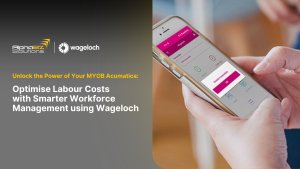Undecided whether to get an ERP upgrade? At the start, businesses use simple digital tools like accounting software to get by but as your business grows, you’ll need more powerful systems to keep up.
Unfortunately, some businesses stick to their old ways without realising the long-term effects of their decision.
In other cases, a business can have an ERP system set up but hesitate on upgrading its solutions.
Why does this happen? Well, more often than not, businesses don’t know when it’s the right time for an ERP upgrade. They overlook these common red flags.
6 Signs You’re Due for an ERP Upgrade
More manual processes
Are you still manually encoding business data on spreadsheets? Or maybe you have separate systems and your employees have to manually export files from one to the other?
Either way, too many manual processes can be an obstacle in your day-to-day operations – affecting your overall productivity and profitability.
On top of that, manual reporting is a slower process. This means you won’t be able to make quick decisions that will get you ahead of your competitors.
Then there are the usual risks of manual tasks – double-entry of data and potential errors. Overall, you end up with a delay of critical data, inaccurate information, and frustrated staff.
By upgrading to an ERP system, you digitise and automate these tasks which will help you focus on more important work and make smarter decisions for your business.
Complexities in Products & Services
More products and services or projects may be exciting for your business but it also comes with added complexities to your operations.
For example, a basic software or an outdated system may not have the capability able to capture differences in services, project types, costs, data from works-in-progress, and revenue.
More products also mean that you’ll need to set up additional inventory requirements for a whole range of reasons depending on your inventory and warehouse management needs and target industry.
Growth in customers
Getting a clear picture of customer demands can be tough without an integrated system. Why rely solely on an accounting system when there are ERP systems that can connect your inventory management, sales trends, special pricing, customer relationship management staff sales performance, and much more in one platform?
The latest ERP systems can help you deal with a growing customer base. Customer data is in a centralized platform, accessible to staff at their fingertips.
If data isn’t synced between departments, your operations can be prone to more errors, time delays, and consequently, unsatisfied customers.
Larger workforce
A larger workforce puts the system at risk in many ways. If you’ve begun experiencing performance issues, this means that your system maybe bursting by the seams, exceeding its capacity of concurrent users and data storage.
Another area is making communication and collaboration smoother between your staff. An end-to-end system connects all departments of your business with a clear workflow or process so your team can focus on adding value to their task at hand.
More locations
As your business grows you may expand to new locations, branches, or acquisitions. If your products and workshops need to be located in different locations.
Having a cloud-based ERP gives users immediate access to the system even users who are the move. It also allows users to trace where products are stored and where jobs are at any point in time.
Having multi-branches across the nation or acquisitions provides you full visibility from the one system. The benefits are obvious:
- Familiarity across all users especially those that work out of multi branches
- Ability to share or restrict customer, supplier, and product accounts across multiple branches
- Real-time access to multi-company or branch reporting.
- Ability to automatically distribute funds across branches, for example, salaries of the head office finance department distributed between head office and the multi-branches.
Expansive modules or add-ons
As your requirements grow, you’ll start looking for other solutions. Some businesses offer additional digital tools or add-on solutions to different departments and for different purposes.
Disconnected tools like these can be costly in the long run because employees will need multiple licenses for different add-ons. On top of that, you’ll need to call in developers and vendors to integrate all these separate apps and provide support.
Then there’s the issue of having to consolidate data from too many sources because of these separate systems. You begin to lose sight of your single source of truth.
Silo systems may fill in the gaps temporarily but as your business continues to grow, you’ll need a system that’s much more flexible. Instead of multiple, separate digital tools, an ERP system offers a singular, multi-purpose solution and can be customised to meet unique business needs.
Let the AlphaBiz team assist you with your upgrade
Have we made a good case for getting an ERP upgrade? Connect with our team and we can help you get started.
For existing MYOB and Sybiz users, we also provide MYOB Advanced support, MYOB Exo support, and Sybiz support for customers who need to switch to the latest ERP version.





